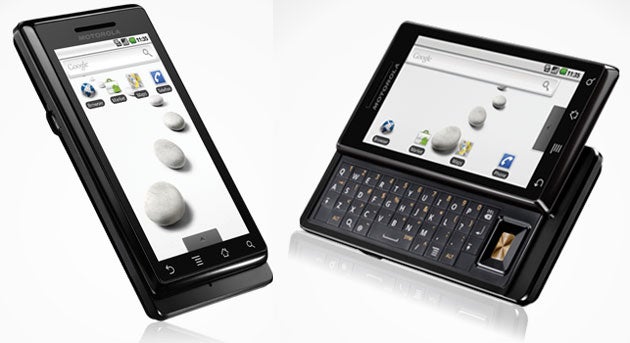Review: Motorola Milestone

If you've somehow managed to get through the festive period without picking up a new phone and you have some change in your pocket to use to that end, there are many things to love about the Motorola Milestone, one of the strongest new contenders to the iPhone's well-deserved crown.
Engineered to incorporate the Google-backed Android operating system, there's some impressive hardware behind efforts to fully realize Google's vision for mobile computing and telephony, delivered through a clean and responsive 3.7-inch touchscreen and powered by a 550 Mhz processor which helps clear up the speed issues which troubled earlier Android handsets.
Featuring a 5-megapixel camera with 4x digital zoom and a flash which shoots decent video (720 x 480 pixels, at 24 frames a second) as well as crisp photos, the phone also has a slide-out keyboard; while a little fiddly at first thanks to the lack of spacing between the buttons, it proves comfortable enough once your thumbs are trained to skip straight to the centre of the keys, and for those users who are light-fingered enough to embrace the alternative, the onscreen touchable keyboard is also comparatively straightforward to use. The four touch-sensitive buttons beneath the screen are responsive and each creates a small jolt of haptic feedback which makes the user interface feel more responsive and, if you're a sucker for well-designed icons, add a splash of finesse to the phone's rugged design.
Since the launch of the first Android phone, the G1, in late 2008, Android's initially anaemic alternative to Apple's app store, the 'Marketplace', has expanded to include more than 10,000 applications, with content to rival the most impressive areas of Apple's iPhone app store all in place, from augmented reality browsers which superimpose information over images from the camera like Layar featuring alongside enough games, both free and paid for, to last you until the keys wear out- not a problem I've had in the time I've been testing the phone, incidentally. Unlike the app store though, the Marketplace is open source and free to anyone to submit an application too, meaning that the censorship problems with which the iPhone has struggled are not an issue here.
The real boon though, as far as apps are concerned, is the seamless integration of Google applications. Gmail users will find that on logging in for the first time their contacts list is populated with all their email contacts, while Google Calendar will automatically sync appointments so that your phone will notify you of upcoming events. Google search and voice search are built in automatically, as is the Maps application, while Google visual search, which will return results based on pictures taken with the camera, is downloadable for free from the marketplace. As far as social networking is concerned, Facebook can be used to populate your phone with the numbers of all of your friends through its own dedicated application, and there are a variety of decent apps available for handling other networks like Twitter and Foursquare.
For the advantages over an iPhone, the list is a long one - a superior camera, for a start, as well as the ability to run apps in the background - you can, for example, write an email while listening to music (the phone incorporates a standard headphone jack, and filling it with your favourite mp3s is a breeze) as you can with native apps on the iPhone, but, unlike the iPhone, third party applications like Spotify can run at the same time as any other apps. But it lacks the polish that an Apple product delivers, and, at £450 for the hardware alone, is certainly on the pricey side - on top of that you're going to need an unlimited data plan to even scratch the surface of the phone's potential, as well as minutes and texts.
In short, the Motorola Milestone certainly lives up to its name by bringing together an excellent piece of hardware and great design with the all the open-source advantages which are going to make 2010 the year Android handsets really take off. While Steve Jobs may not yet be quaking in his boots, the iPhone certainly has a lot to fear from this generation of Google-backed phones, especially since the Milestone was specifically designed around exploiting its weaknesses. For these reasons and more, it's worth considering the Milestone as a viable alternative to Apple's offering, and, if the rise of the Android phone continues, a positive sign of things to come for the next generation of smartphones.
Join our commenting forum
Join thought-provoking conversations, follow other Independent readers and see their replies
Comments
Bookmark popover
Removed from bookmarks